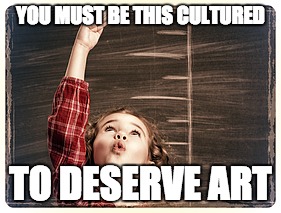If there’s one thing I despise, it’s haughtiness. And also unwashed dishes, seltzer water, and whoever picks the Game of the Year (Witcher 3? Really?). But those aren’t exactly as relevant. But before I delve into why the very condescension and existence of haughtiness make my fists curl, you should know that I am, by nature, a calm and indifferent human when it comes to things I’m not a fan of– the aforementioned examples are the rare exceptions that break through my typical indifference. I find this only makes my aversion all the more poignant, but take this as you will.
As I’ve grown older, I’ve found an emerging passion for accessibility in the arts, and this stems from my incredible opportunities and privileges that I’ve been given to learn and experience arts of all forms. As I realized and learned to appreciate my circumstances, I’ve witnessed others– namely those who ascribe to the idea of ‘high culture’– use their privileges to distinguish and discriminate those around them. I’ve seen opera goers laud themselves for being ‘cultured’, celebrate their circumstances as if they were something they deserved rather than something they were blessed with, and, to be frank, shit on all those who were not like them. And this is what infuriates me.
Art exists to share and create human experiences with one another. Art brings us together, makes us talk, think, and grow. And yet, this socioeconomic distinction between cultured and not exists and thrives and strips ‘high’ art of its very purpose. Attending an institute like Northwestern breeds so many chances to witness both this art that I love and the mentality I hate, and I’ve long grappled with the question, “How can I make this art accessible once more?”
Thankfully, I don’t have to answer this question, because Daniel Mendelsohn already did. In his piece “A Critic’s Manifesto”, Mendelsohn unravels the purpose and brilliance of a cultural critique, and gave to me the sweet reprise of knowing that there are others out there who strive to share the beauty of this art with all who want to see it. Mendelsohn proposes that a proper critic uses their place of privilege to educate others in a way that does not patronize but instead fosters a sense of inclusion and understand. He refers to the work of Andrew Porter and notes that “…by the time [Porter] described what he’d seen on stage, you—the reader—had the background necessary to appreciate (or deprecate) the performance as he had described it.” When I read this line I realized that an entire field already exists and is actively working to undo the arbitrary cultural boundaries I’ve come to loathe.
Although I believe one can appreciate art without any sort of precedence, the notion exists in our society that this high art requires it, so Porter and other critics are here to offer it to all. And that’s enough for me right now. But you know what I’m not still not satisfied about?
Seltzer. It’s just disgusting, folks.

765 Comments
I genuinely believed you would probably have something useful to say. All I hear is a bunch of whining about something that you can fix if you were not too busy looking for attention. After all, I know it was my choice to read.. coloksgp
The way you articulate your ideas demonstrates a deep understanding of the subject matter.
siêuno win